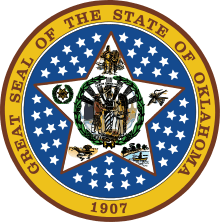Oklahoma Labor Commissioner
The Oklahoma Commissioner of Labor is an elective executive officer of the State of Oklahoma. The Labor Commissioner serves as the head of the Oklahoma Department of Labor. The Labor Commissioner is responsible for supervising the administration of all state laws relating to labor and workplace safety and gathers and publishes information about the workforce of Oklahoma.
Until his death in August, 2015, the Labor Commissioner was Mark Costello, a Republican, who defeated the incumbent Lloyd Fields, a Democrat in the November 2010 election. In November 2015 Oklahoma Governor Mary Fallin appointed Melissa McLawhorn Houston to serve out the remainder of Costello’s term. Houston has said she will not seek reelection to the position in the 2018 election.
History
The Oklahoma Department of Labor was created by the Oklahoma Constitution in 1907. In August of that year, delegates from the labor unions of the Twin-Territorial Federation of Labor, the State Farmers' Union and the Railroad Brotherhoods met in Shawnee, Oklahoma, to formulate a list of demands for the upcoming constitutional convention. One demand called for the establishment of a State Labor Department.
Consequently, when the new state constitution was ratified by the delegates to the constitutional convention in 1907, the Oklahoma Department of Labor was created, with the Labor Commissioner as its head. The Labor Commissioner is responsible for the enforcement of labor laws that promote fairness and equity in the workforce, including state wage laws, workers' compensation compliance, state OSHA laws for public employers, asbestos compliance, child labor laws and various other duties.
The office of the Labor Commissioner has been both appointive and elective at various times in Oklahoma's history.
Term of office
The Labor Commissioner serves as four-year term that runs concurrent with that of the Governor of Oklahoma.
Powers and responsibilities
 |
| This article is part of a series on the politics and government of Oklahoma |
|
Constitution |
|
Executive
|
|
Legislature |
|
Divisions |
|
Federal Relations
|
|
The Oklahoma Constitution sets two responsibilities for the Labor Commissioner: (1) serve as the head of the Department of Labor and (2) serve as the chairman of the Board of Arbitration and Conciliation in the Department of Labor. As such, the vast majority of the Labor Commissioner's responsibilities are determined by acts of the Oklahoma Legislature.
As the head of the Labor Department, the Labor Commissioner is the chief executive officer of the Department and supervises the work of that Department. In doing so, the Labor Commissioner is to foster, promote, and develop the welfare of workers, to improve working conditions of workers, to advance opportunities of workers for profitable employment, and for carrying into effect all laws in relation to labor enacted by the Legislature. In performing his official duties, the Labor Commissioner may administer oaths, issue subpoenas for the attendance of witnesses and take testimony in all matters relating to the proper enforcement of all laws over which the Commissioner has supervision of.
Office holders
The following is an incomplete list of those individuals who have served as Labor Commissioner for Oklahoma:
| Name | Party | Term |
|---|---|---|
| Charles A. Daugherty | Democratic | 1907–1911 |
| W.G. Ashton | Democratic | 1915–1919 |
| Claude Connally | Democratic | 1919–1927 |
| W.A. Pat Murphy | Democratic | 1927–1947 |
| Jim Hughes | Democratic | 1947–1963 |
| W.T. Bill Hughes | Democratic | 1963–1967 |
| L.E. Bailey | Republican | 1967–1971 |
| Wilbur Wright | Democratic | 1971–1973 |
| L.P. Williams | Democratic | 1973–1975 |
| Wilbur Wright | Democratic | 1/13/1975 – 11/1/1975 |
| William A. Foster | Democratic | 1975–1979 |
| William R "Bill" Paulk | Democratic | 1979–1987 |
| Dean Calhoon | Republican | 1987–1990 |
| Ira Phillips | Republican | 1990–1991 |
| Dave Renfro | Democratic | 1991–1995 |
| Brenda Reneau | Republican | 1995–2007 |
| Lloyd Fields | Democrat | 2007–2011 |
| Mark Costello | Republican | 2011–2015 |
| Melissa McLawhorn Houston | Republican | 2015-Current |
